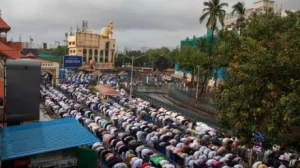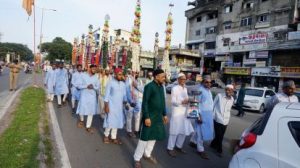Maharashtra– The Maharashtra government’s recent decision to modify the Eid-e-Milad holiday schedule demonstrates remarkable administrative foresight in managing religious festival overlaps. This strategic intervention ensures the smooth celebration of both Eid-e-Milad and Anant Chaturdashi while maintaining communal harmony across Mumbai and its suburbs.
The Eid-e-Milad holiday schedule adjustment reflects the government’s commitment to accommodating diverse religious celebrations without creating logistical complications. Originally planned for September 5, the celebration required careful reconsideration due to potential conflicts with major Hindu festivals.
The Eid-e-Milad holiday schedule change emerged from practical considerations regarding festival calendar overlaps. Anant Chaturdashi, marking the culmination of Ganesh Utsav, falls on September 6, 2025, creating potential scheduling conflicts with the original Eid-e-Milad observance date.
 Maharashtra’s General Administration Department issued official notifications clarifying the Eid-e-Milad holiday schedule modifications. Government offices in Mumbai city and suburban districts would remain operational on September 5, with the public holiday rescheduled to September 8.
Maharashtra’s General Administration Department issued official notifications clarifying the Eid-e-Milad holiday schedule modifications. Government offices in Mumbai city and suburban districts would remain operational on September 5, with the public holiday rescheduled to September 8.
Also Read: Eid-e-Milad holiday schedule? Was this last last-minute decision?
Similar: Celebrating Global Traditions this Eid
This administrative decision demonstrates the government’s proactive approach to preventing potential disruptions in public services while respecting religious observances. The Eid-e-Milad holiday schedule adjustment ensures adequate spacing between major religious celebrations.
The Eid-e-Milad holiday schedule modifications follow established precedents of festival coordination in Maharashtra. In September 2024, the government similarly rescheduled the Eid-e-Milad holiday from September 16 to September 18 to avoid conflicts with Ganpati immersion ceremonies.
These recurring adjustments highlight the government’s systematic approach to managing the Eid-e-Milad holiday schedule in coordination with other significant religious festivals. The pattern demonstrates consistent administrative wisdom in preventing communal tensions and logistical challenges.
Previous instances of Eid-e-Milad holiday schedule modifications have received positive responses from community leaders and religious organisations. The collaborative approach ensures peaceful coexistence of diverse religious celebrations throughout Maharashtra.
The Eid-e-Milad holiday schedule adjustment directly affects government office operations across Mumbai and suburban areas. Administrative departments prepared contingency plans to maintain essential services while honouring the rescheduled holiday observance.
Government employees received clear instructions regarding the modified Eid-e-Milad holiday schedule through official circulars from the General Administration Department. This transparent communication prevented confusion and ensured smooth operational transitions.


Religious leaders from both Muslim and Hindu communities appreciated the government’s sensitive handling of the Eid-e-Milad holiday schedule modification. Community leaders, including Samajwadi Party leader Abu Asim Azmi, have engaged with government officials regarding the rescheduled celebrations.
The collaborative approach to managing the Eid-e-Milad holiday schedule demonstrates interfaith cooperation in Maharashtra’s diverse religious landscape. Community representatives actively participated in discussions to ensure peaceful festival celebrations.
Local organisations coordinated their activities in accordance with the revised Eid-e-Milad holiday schedule, demonstrating remarkable adaptability and communal harmony. This cooperative spirit reflects the mature approach of Maharashtra’s religious communities toward festival management.
The Eid-e-Milad holiday schedule modification affects various sectors, including commerce, education, and transportation. Businesses adjusted their operational schedules to accommodate the rescheduled holiday while maintaining customer service standards.
Educational institutions coordinated their academic calendars with the revised Eid-e-Milad holiday schedule to minimise disruption to student activities. Schools and colleges demonstrated flexibility in adapting to the administrative changes.
Transportation services, including local trains and buses, adjusted their schedules to accommodate the new Eid-e-Milad holiday schedule. These adjustments ensured adequate public transportation availability during both religious festivals.
The successful management of the Eid-e-Milad holiday schedule establishes valuable precedents for future festival coordination. Government departments developed standardised procedures for handling similar situations involving overlapping religious celebrations.
 Maharashtra’s approach to the Eid-e-Milad holiday schedule serves as a model for other states facing similar challenges with festival calendar management. The systematic methodology demonstrates effective governance in diverse religious contexts.
Maharashtra’s approach to the Eid-e-Milad holiday schedule serves as a model for other states facing similar challenges with festival calendar management. The systematic methodology demonstrates effective governance in diverse religious contexts.
Future planning initiatives incorporate lessons learned from the Eid-e-Milad holiday schedule adjustments. Administrative departments prepared comprehensive guidelines for managing religious festival overlaps while maintaining public service efficiency.
The Maharashtra government’s handling of the Eid-e-Milad holiday schedule modification exemplifies thoughtful governance in managing diverse religious celebrations. This strategic decision ensures peaceful observance of both Eid-e-Milad and Anant Chaturdashi while maintaining governmental operational efficiency.
The successful coordination demonstrates the importance of proactive planning in managing religious festival schedules. Maharashtra’s approach provides a blueprint for other states seeking to balance religious diversity with administrative effectiveness, ensuring that all communities can celebrate their traditions harmoniously within the framework of efficient governance.

